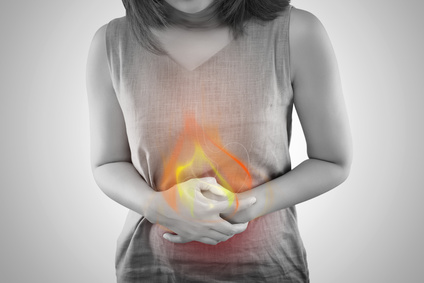Stomach Stress Ulcer and Other Stomach Symptoms
Stress has wide ranging effects on the body and the stomach can also be affected. From a loss of appetite to indigestion, there are many stomach symptoms that are associated with stress. It is also not uncommon to hear about a stress ulcer or gastritis caused by stress. However, it is important to differentiate between stomach conditions that are caused by stress or simply worsened by stress but had already existed.
Stress and the Stomach
Although we use the word ‘stress’ loosely to refer to psychological stress, the body can also undergo physiologic stress with prolonged and severe illnesses. Both types of stress affects the way the body functions even in organs that were otherwise healthy. With the stomach, the effects of stress are more likely to be felt when its functions are affected.
For example, stomach acid secretion may increase or stomach churning may intensify with stronger muscle contractions. These effects can lead to symptoms, such as a burning pain in the stomach or a cramping stomach pain. It can also lead to gastritis, stomach ulcers and may also contribute to various stomach symptoms.
Read more on nervous stomach.
Stress and the Abdomen
The abdomen is often incorrectly referred to as the stomach. The stomach is only one organ in the abdomen. Other organs lie close to it so the symptoms can sometimes be difficult to isolate to a specific condition. These other organs can all be affected by stress in different ways. For example, abdominal cramps may occur with stress due to intestinal spasms. Similarly underlying conditions like irritable bowel syndrome (IBS) and inflammatory bowel disease (IBD) may also worsen with stress.
Stress Gastritis and Stress Ulcer
Stress-induced gastritis and stress ulcer syndrome are a type of gastritis and stomach ulcer, respectively. These conditions occur with physiologic stress, like with severe injury, extensive burns, sepsis (“blood poisoning”) and multi-organ failure. However, the stress gastritis and stress ulcer covered in this article will focus on psychological stress.
Gastritis with Psychological Stress
Gastritis is inflammation of the stomach wall. This is a common condition that occurs for various reasons and not only with stress. The two most common causes of gastritis are excessive use of NSAIDs and H.pylori infection.
Normally a layer of mucus separates the stomach wall from the corrosive stomach enzymes and acid. However, this mucus barrier can be compromised and the stomach acid then irritates and inflames the stomach wall tissue.
Even if gastritis is present before psychological stress arises, stress can worsen it. Sometimes mild gastritis is unnoticed until the symptoms intensify with psychological stress. Therefore stress did not cause the gastritis but exacerbated the condition and the symptoms.
Ulcers with Psychological Stress
Stomach ulcers are open sores in the wall of the stomach. Ulcers can vary in depth and in severe but rare cases there may be a perforation (hole) in the stomach wall. It occurs for the same reasons as gastritis. Stress aggravates the symptoms of stomach ulcers. It may also worsen the condition. One of the main reasons is that stomach acid increases with stress. This further irritates and inflames the exposed area of the stomach wall.
Furthermore the alteration in appetite may also worsen stomach ulcers. Some people experience increased appetite, while others find their appetite is reduced during stressful period. Both changes of appetite and eating habits may affect the exposed area of the stomach wall known as the ulcer.
Other Stomach Stress Conditions
Stomach pain and stomach cramps are two other symptoms that may be aggravated by psychological stress.
Stomach Pain and Stress
Stomach pain occurs for various reasons. From the inflammation of the stomach wall in gastritis to the exposed tissue in stomach ulcers, pain is prominent in both of these common stomach conditions. Stress increases stomach acid secretion and increases the strength of stomach muscle contractions which are two of the main factors for pain and cramps.
Both the pain and cramps can occur even without gastritis and stomach ulcers. However, recurrent or persistent pain in the stomach are more likely to be due to gastritis or stomach ulcers. It can range from a dull gnawing ache to a burning pain or sharp stabbing pain in severe cases.
Cramps may arise on its own, when hungry or during and after meals. These cramps are abnormally strong contractions of the stomach muscles. Stomach cramps are not specific to any condition. It can sometimes occur for no clearly identifiable reason. It is also possible that the pain and stomach cramps are psychogenic and not due to any physical problem.
Upset Stomach and Stress
An upset stomach, also known as indigestion or non-ulcer dyspepsia, is a common condition that every person experiences occasionally even without stress. It may arise with stress or the consequences of stress such as overeating, missing meals or consuming certain foods and beverages like alcoholic drinks. It can also occur for no known reason. Stress does tend to worsen episodes of indigestion in some people.
Read more on upset stomach.
How to Prevent Stress Stomach Problems?
Stress management is an important component in preventing or reducing the severity of stress-related stomach conditions. Diet and lifestyle changes can also be helpful.
- Eat frequent meals that are moderately sized. Do not miss meals or eat very large meals as it can aggravate stomach conditions such as gastritis and ulcers.
- Avoid spicy food as this may worsen gastritis, ulcers and trigger indigestion. If spicy food is to be consumed then only consume small portions.
- Caffeinated beverages may also be a problem. Caffeine is a stimulant and may increase stomach acid production.
- Alcohol is an irritant that can worsen stomach symptoms and conditions. It should be minimized or avoided if it triggers or aggravates symptoms.
- Tobacco smoking and chewing may also be a problem. Smokers tend to increase smoking during periods of stress which can exacerbate stomach conditions.
- Do not eat meals just before bedtime. Depending on underlying conditions, it may contribute to acid reflux and heartburn. The guidelines for gastritis diet can be helpful for stress-related stomach conditions.







